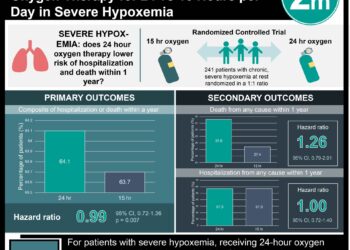Lower oxygenation does not improve mortality in hypoxemic respiratory failure
1. A lower oxygenation target was shown not to decrease the 90-day mortality in patients with acute hypoxemic respiratory failure compared to a high oxygenation target.
2. Additionally, an increase in the median percentage of days alive after hospital discharge was not significantly different in patients between the two oxygenation targets.
Evidence Rating Level: 1 (Excellent)
Study Rundown: Patients with acute hypoxemic respiratory failure receive supplemental oxygen with a high fraction of inspired oxygen (FIO2) within the intensive care unit. A high FIO2 causes a high partial pressure of arterial oxygen (PaO2). Though this therapy is previously associated with increased mortality, no clinical practice guidelines for oxygen targets are present to maximize benefit. As such, this study tested the ability for a five-percentage point reduction in 90-day mortality for a low oxygenation target (PaO2 of 60 mm Hg) compared to a high oxygenation target (PaO2 of 90 mm Hg). The study determined a lower oxygenation target did not reduce the 90-day mortality in patients compared to the higher oxygenation target. The randomized control trial was limited by the trial oxygenation targets may not be the standard of care in some countries. Therefore, the validity of the findings may not be universally applied at institutions with different practices. Nonetheless, this study’s results are significant, and its findings highlight no difference between a lower and higher oxygenation target in lowering the 90-day mortality for acute hypoxemic respiratory failure.
Click to read the study in NEJM
Relevant Reading: Effect of Conservative vs Conventional Oxygen Therapy on Mortality Among Patients in an Intensive Care Unit: The Oxygen-ICU Randomized Clinical Trial
In-Depth [randomized controlled trial]: This randomized control trial enrolled 2,928 participants in a multicenter study at 35 sites in seven European countries. Participants included in the study were ≥ 18 years of age, hospitalized with hypoxemic respiratory failure, and received at least 10 liters of oxygen per minute in an open system. Participants unable to undergo randomization within 12 hours of hospitalization were excluded from this study. The participants were randomized in a 1:1 ratio to receive oxygen therapy targeting a PaO2 of 60 mm Hg or 90 mm Hg, respectively. The primary endpoint was death from any cause within 90 days of randomization.
After 90 days from randomization, the mortality was 42.9% (618 of 1441 participants) in the lower oxygenation group compared to 42.4% (613 of 1147 participants) in the higher oxygenation group (risk ratio, 1.02; 95% confidence interval [CI], 0.94 to 1.11; P=0.64). The odds ratio was 1.06 (95% CI, 0.90 to 1.24; P=0.50) after adjustment for stratification and baseline variables. Furthermore, the median percentage of days participants were alive without life support was 87.8 days in the lower oxygenation group compared to 84.4 days in the higher oxygenation group (P=0.10). Additionally, the median percentage of days participants were alive after hospital discharge was 55.6 days in the lower oxygenation group compared to 50.0 days in the higher oxygenation group (P=0.67). Finally, serious adverse events between the lower oxygenation group (36.1%; 525 of 1453 events) and the higher oxygenation group (38.1%; 555 of 1457 events) were not significantly different (P=0.24). Taken together, a lower oxygenation target did not reduce 90-day mortality in acute hypoxemic respiratory failure compared to a higher oxygenation target.
Image: PD
©2021 2 Minute Medicine, Inc. All rights reserved. No works may be reproduced without expressed written consent from 2 Minute Medicine, Inc. Inquire about licensing here. No article should be construed as medical advice and is not intended as such by the authors or by 2 Minute Medicine, Inc.








